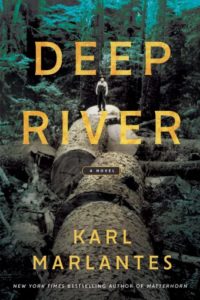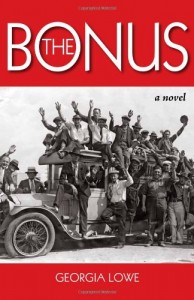Karl Marlantes: Deep River, a Novel
November 19, 2019 by David
Filed under Fiction, WritersCast
 Deep River – Karl Marlantes – 978-0-8021-2538-5 – Atlantic Monthly Press – Hardcover – 736 pages – $30 – July 2, 2019 – ebook version widely available at lower prices.
Deep River – Karl Marlantes – 978-0-8021-2538-5 – Atlantic Monthly Press – Hardcover – 736 pages – $30 – July 2, 2019 – ebook version widely available at lower prices.
“Deep River seems a work born from Willa Cather by way of Upton Sinclair. But this new book is its own animal, and it’s something of a masterpiece… In Deep River, [Aino] takes her place beside Antonia Shimerda as one of the great heroines of literature.”—BookPage (starred review)
Several years ago I discovered Karl Marlantes’ first novel, Matterhorn, which is a loosely autobiographical novel about the Vietnam War, in which Karl served as a Marine lieutenant. I think that is one of the best war novels I have ever read and was pleased to interview Karl about that book.
That book was followed by a nonfiction book called What it is Like to Go to War, which I also read and was affected by. What I said in 2011 still holds true: this book is a deeply thoughtful and moving work of nonfiction about the nature and meaning of war, and what it means to the individual warriors who participate who fight, as well as to the society that gives them that responsibility.
It took Marlantes almost thirty years to write and rewrite Matterhorn. Almost ten years after he completed that book, he has now turned in a completely different book, an historical novel set in the early 1900s, starting in Russian occupied Finland and moving to the Pacific Northwest. The three Koski siblings, Ilmari, Matti, and the politically radical young Aino, flee Russian oppression and come to the United States.
They join a community of other Finns in the logging area in southern Washington, during a time when massive trees of the old growth forest are being harvested by hard working men and dangerous technology. It is fertile ground for the establishment of radical labor movements like the IWW (Industrial Workers of the World, also known as the Wobblies). The two Koski brothers build their lives in this environment amid danger and many challenges, while Aino, just one of the book’s many also hard working independent women, works to build a union in an environment where organized labor is not welcomed by the logging industry or the power structures of the day.
Karl has built this novel following the structure and characters of the great stories of the Finnish oral tradition, written down in the nineteenth century as the Kalevala. It is a truly magisterial novel that weaves together so many strands of American and immigrant cultures, documents the struggles of the early twentieth century in the great forests of the Pacific Northwest, and shows us how human beings find a way to make meaningful lives despite the harshest challenges. Nothing comes easy for the Koskis their friends and families, but everything about them is redemptive and strong. It’s impossible to read this book and not be moved.
Reading Deep River is a commitment – it’s a long book – and there are inevitably times when it becomes difficult to keep track of the whole story and the many compelling characters in the book. That is not a criticism. The book is gripping, and well worth the time and attention of the reader. And it is impossible not to read it in the context of our current political circumstance. Reading about the sacrifices made by workers in the early twentieth century, to make advances for labor that are now taken for granted, and imagining their struggles as evidenced by the characters in this book, who are so thoroughly human in their differences and outlooks, personalities and beliefs, brings forth a range of thoughts about what has become of America today. We live in a world that others made great sacrifices for, and have somehow managed to avoid making sacrifices of our own. The people of Deep River as imagined by Karl Marlantes, deserve better from us.
I had the great pleasure to interview Karl in New Haven in a building on the Yale campus, where he was visiting during his book tour.
Karl Marlantes graduated from Yale University and was a Rhodes Scholar at Oxford University, before serving as a Marine in Vietnam, where he was awarded the Navy Cross, the Bronze Star, two Navy Commendation Medals for valor, two Purple Hearts, and ten air medals. He is the author of the novel, Matterhorn and a work of nonfiction, What It Is Like to Go to War. He lives now in Washington State.
Buy Deep River from RJ Julia here.
Podcast: Play in new window | Download
Georgia Lowe: The Bonus (a novel)
January 26, 2012 by David
Filed under Fiction, WritersCast
 978-0615371450 – Lucky Dime Press – $18.95 – paperback (ebook editions available)
978-0615371450 – Lucky Dime Press – $18.95 – paperback (ebook editions available)
I confess to be particularly fond of Depression era novels and nonfiction. The 1920s and 1930s were incredible periods in American history, so much like the present time it is sometimes strange and even eery. I’m not sure how many readers coming to this novel will know its historical background. In 1932, at the height of the Great Depression, while Hoover was still President, thousands of World War I veterans mobilized to lobby Congress to pass a bill to give them their war service bonuses immediately, to save them from utter poverty and starvation. 2o,000 of them ended up camped in and around Washington, D.C. at the end of their Bonus March.
The political elements of this story sound pretty familiar to anyone who is paying attention to modern political speech. It’s impossible to not think about the Occupy movement as you read this novel, which of course was conceived and written long before that movement’s inception.
Georgia Lowe’s parents were bonus marchers. She grew up hearing their stories about the hot summer of 1932 in Washington, D.C., when General MacArthur, himself also a World War I veteran, brutally dispersed the homeless and destitute marchers, including the families of the vets. Those stories inspired her, but she did not even begin to write fiction until she was much older. She started the novel more than 10 years ago, using elements of her own family’s stories to create the framework of her novel.
I found The Bonus to be a remarkably well written novel that flows beautifully and naturally. I’d characterize it as a “naturalistic” novel, and it feels to me as if it could have been written in the 1930s, with a truly authentic sense of the period, the places and the people of that time. The story focuses on Bonnie and Will, she a struggling actress and he a journalist (and veteran in denial of the pain of his wartime experience), both of them living reasonably well in Hollywood. They each become connected to the Bonus March in different ways, and end up together in Washington, where their personal lives become entwined with the real events surrounding the marchers and their treatment in the capitol. You’re not reading a novel to learn the history, but you will learn it and I think you will feel, as I did, that history is remarkably circular.
I think history has birthed a wonderful novelist. The Lucky Dime website tells us that Georgia is hard at work on two new novels, a prequel to The Bonus entitled An Ordinary Kid and a sequel, The Old Ladies. These are books I will want to read. I can’t resist making a plug for another novel, one that was actually written in the 1930s by a now almost forgotten writer, Thomas Boyd, In Time of Peace, a book I think should be read together with The Bonus to create a really powerful understanding of our own period through the lens of another.
Talking with Georgia was alot of fun for me since I liked her book so much. I hope you will enjoy it as well. And I am not alone in liking this book alot – The Bonus won first place in the highly competitive Mainstream/Literary Fiction category of the Writer’s Digest Self Published Book Awards.
Podcast: Play in new window | Download

